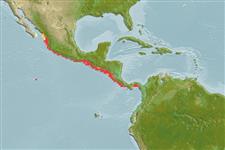Teleostei (teleosts) >
Eupercaria/misc (Various families in series Eupercaria) >
Sciaenidae (Drums or croakers)
Etymology: Umbrina: Latin, umbra, -ae = shadow, in the sense of phantom; due to its quick movements (Ref. 45335).
Eponymy: William ‘Bill’ A. Bussing (1933–2014) was an American ichthyologist at the School of Biology, Universidad de Costa Rica where he taught for over four decades, retiring as Professor Emeritus (1991). Military service in Korea interrupted his education [...] (Ref. 128868), visit book page.
Environment: milieu / climate zone / depth range / distribution range
Ecology
Marine; benthopelagic; depth range 32 - 290 m (Ref. 58018). Tropical; 24°N - 8°N
Eastern Central Pacific: southern Baja California, Mexico to Costa Rica.
Size / Weight / Age
Maturity: Lm ? range ? - ? cm
Max length : 30.0 cm TL male/unsexed; (Ref. 9118)
Short description
Identification keys | Morphology | Morphometrics
Body elongated, with back and belly normally arched; snout pointed; mouth small and inferior; lower jaw enclosed by upper; chin with one stiff barbel; edge of preopercle serrate; lower branch of first gill arch with 11 to 13 gill rakers; second dorsal fin moderately long, with 12 to 23 soft rays; body uniformly dark and silvery; back with one or more indistinct dark spots; roof of mouth and top of branchial cavity black; opercle translucent, resembling a spot externaly (Ref. 55763).
Life cycle and mating behavior
Maturity | Reproduction | Spawning | Eggs | Fecundity | Larvae
Chao, L.N., 1995. Sciaenidae. Corvinas, barbiches, bombaches, corvinatas, corvinetas, corvinillas, lambes, pescadillas, roncachos, verrugatos. p. 1427-1518. In W. Fischer, F. Krupp, W. Schneider, C. Sommer, K.E. Carpenter and V. Niem (eds.) Guia FAO para identificacion de especies para los fines de la pesca. Pacifico Centro-oriental. 3 volumes. 1813 p. (Ref. 9118)
IUCN Red List Status (Ref. 130435: Version 2024-1)
Threat to humans
Harmless
Human uses
Fisheries: minor commercial
Tools
Special reports
Download XML
Internet sources
Estimates based on models
Preferred temperature (Ref.
123201): 13.3 - 21.5, mean 15.3 °C (based on 23 cells).
Phylogenetic diversity index (Ref.
82804): PD
50 = 0.5000 [Uniqueness, from 0.5 = low to 2.0 = high].
Bayesian length-weight: a=0.00933 (0.00472 - 0.01845), b=3.08 (2.92 - 3.24), in cm total length, based on LWR estimates for this Genus-body shape (Ref.
93245).
Trophic level (Ref.
69278): 3.3 ±0.5 se; based on size and trophs of closest relatives
Resilience (Ref.
120179): High, minimum population doubling time less than 15 months (Preliminary K or Fecundity.).
Fishing Vulnerability (Ref.
59153): Low vulnerability (20 of 100).
